Joe Biden announces 2024 reelection bid: ‘Let’s finish this job’
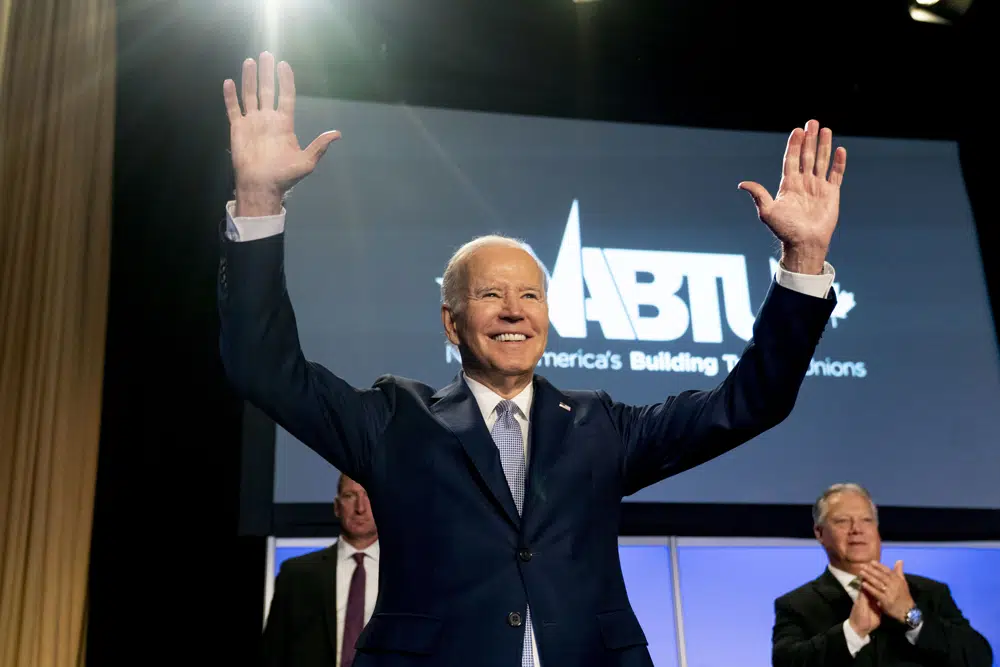
President Joe Biden on Tuesday formally announced that he is running for reelection in 2024, asking voters to give him more time to “finish this job” and extend the run of America’s oldest president for another four years. Biden, who would be 86 at the end of a second term, is betting his first-term legislative achievements and more than 50 years of experience in Washington will count for more than concerns over his age. He faces a smooth path to winning his party’s nomination, with no serious Democratic challengers. But he’s still set for a hard-fought struggle to retain the presidency in a bitterly divided nation. In his first public appearance Tuesday since the announcement, Biden offered a preview of how he plans to navigate the dual roles of president and presidential candidate, using a speech to building trades union members to highlight his accomplishments and undercut his GOP rivals, while showing voters he remained focused on his day job. Greeted with chants of “Let’s Go Joe” from a raucous crowd of building trades union members — a key base of Democratic support — Biden showcased the tens of thousands of construction jobs being created since he took office that are supported by legislation he signed into law. “We — you and I — together, we’re turning things around, and we’re doing it in a big way,” Biden said. “It’s time to finish the job. Finish the job.” Biden’s campaign announcement, in a three-minute video, comes on the four-year anniversary of when he declared for the White House in 2019, promising to heal the “soul of the nation” amid the turbulent presidency of Donald Trump — a goal that has remained elusive. “I said we are in a battle for the soul of America, and we still are,” Biden said. “The question we are facing is whether in the years ahead we have more freedom or less freedom. More rights or fewer.” While the prospect of seeking reelection has been a given for most modern presidents, that’s not always been the case for Biden. A notable swath of Democratic voters has indicated they would prefer he not run, in part because of his age. Biden has called those concerns “totally legitimate,” but he did not address the issue head-on in his launch video. Yet few things have unified Democratic voters like the prospect of Trump returning to power. And Biden’s political standing within his party stabilized after Democrats notched a stronger-than-expected performance in last year’s midterm elections. The president is set to run again on the same themes that buoyed his party last fall, particularly on preserving access to abortion. “Freedom. Personal freedom is fundamental to who we are as Americans. There’s nothing more important. Nothing more sacred,” Biden said in the launch video, depicting Republican extremists as trying to roll back access to abortion, cut Social Security, limit voting rights, and ban books they disagree with. “Around the country, MAGA extremists are lining up to take those bedrock freedoms away.” As the contours of the campaign begin to take shape, Biden plans to run on his record. He spent his first two years as president combating the coronavirus pandemic and pushing through major bills such as the bipartisan infrastructure package and legislation to promote high-tech manufacturing and climate measures. The president also has multiple policy goals and unmet promises from his first campaign that he’s asking voters to give him another chance to fulfill. “Let’s finish this job. I know we can,” Biden said in the video, repeating a mantra he said a dozen times during his State of the Union address in February. Vice President Kamala Harris, who was featured prominently alongside Biden in the video, held a political rally at Howard University in Washington on Tuesday evening in support of abortion access, kicking off her own efforts to support the reelection effort. Saying she’s “proud to run for reelection with President Joe Biden,” Harris added, “Our hard-won freedoms are under attack. And this is a moment for us to stand and fight.” In the video, Biden speaks over brief clips and photographs of key moments in his presidency, snapshots of diverse Americans, and flashes of outspoken Republican foes, including Trump, Florida Gov. Ron DeSantis, and Rep. Marjorie Taylor Greene of Georgia. He exhorts supporters that “this is our moment” to “defend democracy. Stand up for our personal freedoms. Stand up for the right to vote and our civil rights.” Biden also plans to point to his work over the past two years shoring up American alliances, leading a global coalition to support Ukraine’s defenses against Russia’s invasion and returning the U.S. to the Paris climate accord. But public support in the U.S. for Ukraine has softened in recent months, and some voters question the tens of billions of dollars in military and economic assistance flowing to Kyiv. The president also faces lingering criticism over his administration’s chaotic 2021 withdrawal from Afghanistan after nearly 20 years of war, which undercut the image of competence he aimed to portray, and he’s the target of GOP attacks over his immigration and economic policies. As a candidate in 2020, Biden pitched voters on his familiarity with the halls of power in Washington and his relationships around the world. But even back then, he was acutely aware of voters’ concerns about his age. “Look, I view myself as a bridge, not as anything else,” Biden said in March 2020, as he campaigned in Michigan with younger Democrats, including Harris, Sen. Cory Booker of New Jersey and Michigan Gov. Gretchen Whitmer. “There’s an entire generation of leaders you saw stand behind me. They are the future of this country.” Three years later, the president now 80, Biden allies say his time in office has demonstrated that he saw himself as more of a transformational than a transitional leader. Still, many Democrats would prefer that Biden didn’t run again. A recent poll from The Associated Press-NORC Center for Public Affairs Research shows just 47% of Democrats say they want him to seek a second term, up from 37% in February. And Biden’s verbal — and occasional physical — stumbles have become fodder for critics trying to
Joe Biden in State of Union promises to ‘finish the job’
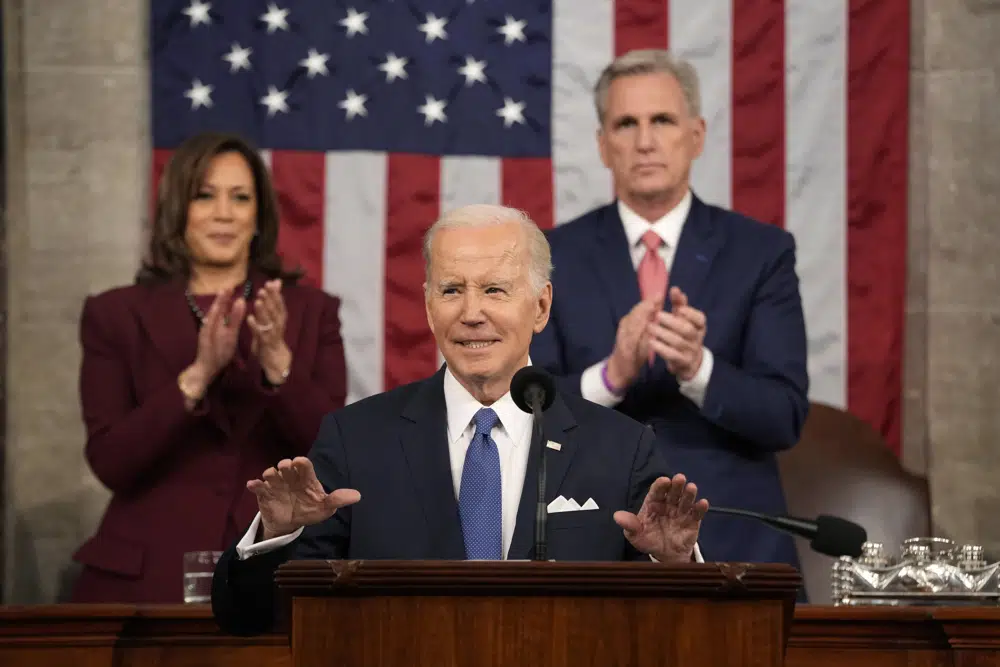
President Joe Biden exhorted Republicans over and over Tuesday night to work with him to “finish the job” of rebuilding the economy and uniting the nation as he delivered a State of the Union address meant to reassure a country beset by pessimism and fraught political divisions. The backdrop for the annual address was markedly different from the previous two years, with a Republican speaker sitting expressionless behind Biden and GOP lawmakers in the audience preparing to scrutinize both his administration and his policies. But Biden sought to portray a nation dramatically different in positive ways from the one he took charge of two years ago: from a reeling economy to one prosperous with new jobs, from a crippled, pandemic-weary nation to one that has now opened up and a democracy that has survived its biggest test since the Civil War. “The story of America is a story of progress and resilience. Of always moving forward. Of never giving up. A story that is unique among all nations,” Biden said. “We are the only country that has emerged from every crisis stronger than when we entered it. That is what we are doing again.” He added: “We’re not finished yet by any stretch of the imagination.” Biden sought to reassure the nation that his stewardship of the country has delivered results both at home and abroad, as he also set out to prove his fitness for a likely re-election bid. But the challenges for Biden are many: economic uncertainty, a wearying war in Ukraine, growing tensions with China, and more. And signs of the past trauma at the Capitol, most notably the January 6, 2021 insurrection at the Capitol, was unavoidable, with a large fence encircling the complex as lawmakers and those in attendance faced tighter-than-usual security measures. From the start, the partisan divisions were clear. Democrats — including Vice President Kamala Harris — jumped to applause as Biden began his speech. New Republican House Speaker Kevin McCarthy, though he had greeted the president warmly when he entered the chamber, stayed in his seat. Rather than rolling out flashy policy proposals, the president set out to offer a reassuring assessment of the nation’s condition, declaring that two years after the Capitol attack, America’s democracy was “unbowed and unbroken.” “The story of America is a story of progress and resilience,” he said, highlighting record job creation during his tenure as the country has emerged from the COVID-19 pandemic. Biden also pointed to areas of bipartisan progress in his first two years in office, including on states’ vital infrastructure and high-tech manufacturing. And he says, “There is no reason we can’t work together in this new Congress.” “The people sent us a clear message. Fighting for the sake of fighting, power for the sake of power, conflict for the sake of conflict, gets us nowhere,” Biden said. “And that’s always been my vision for the country: to restore the soul of the nation, to rebuild the backbone of America — the middle class — to unite the country.” “We’ve been sent here to finish the job!” The president took to the House rostrum at a time when just a quarter of U.S. adults say things in the country are headed in the right direction, according to a new poll by The Associated Press-NORC Center for Public Affairs Research. About three-quarters say things are on the wrong track. And a majority of Democrats don’t want Biden to seek another term. He sought to confront those sentiments head-on. “You wonder whether a path even exists anymore for you and your children to get ahead without moving away, I get it,” Biden said. “That’s why we’re building an economy where no one is left behind. Jobs are coming back; pride is coming back because of the choices we made in the last two years. Arkansas Gov. Sarah Huckabee Sanders, who gained a national profile as Trump’s press secretary, was to deliver the Republican response to Biden’s speech. She was to focus much of her remarks on social issues, including race in business and education and alleged big-tech censorship of conservatives. “While you reap the consequences of their failures, the Biden administration seems more interested in woke fantasies than the hard reality Americans face every day,” she was to say, according to excerpts released by her office. “Most Americans simply want to live their lives in freedom and peace, but we are under attack in a left-wing culture war we didn’t start and never wanted to fight.” With COVID-19 restrictions now lifted, the White House and legislators from both parties invited guests designed to drive home political messages with their presence in the House chamber. The parents of Tyre Nichols, who was severely beaten by police officers in Memphis and later died, are among those seated with first lady Jill Biden. Other Biden guests included the rock star/humanitarian Bono and the 26-year-old who disarmed a gunman in last month’s Monterey Park, California, shooting. Members of the Congressional Black Caucus invited family members of those involved in police incidents as they sought to press for action on police reform in the wake of Nichols’ death. The White House, ahead of the speech, paired police reform with bringing down violence, suggesting that giving police better training tools could lead to less crime nationwide. Biden was shifting his sights after spending his first two years pushing through major bills such as the bipartisan infrastructure package, legislation to promote high-tech manufacturing, and climate measures. With Republicans now in control of the House, he is turning his focus to implementing those massive laws and making sure voters credit him for the improvements. Biden, not known for his oratory, appeared relaxed and confident as he delivered his address. He casually adlibbed remarks, fed off the responses from Democratic lawmakers who frequently stood up with thunderous ovations and playfully engaged with his Republican critics. Addressing Republicans who voted against the big bipartisan infrastructure law, Biden said he’d still ensure their pet projects
Ron DeSantis leads PredictIt’s 2024 general presidential election market
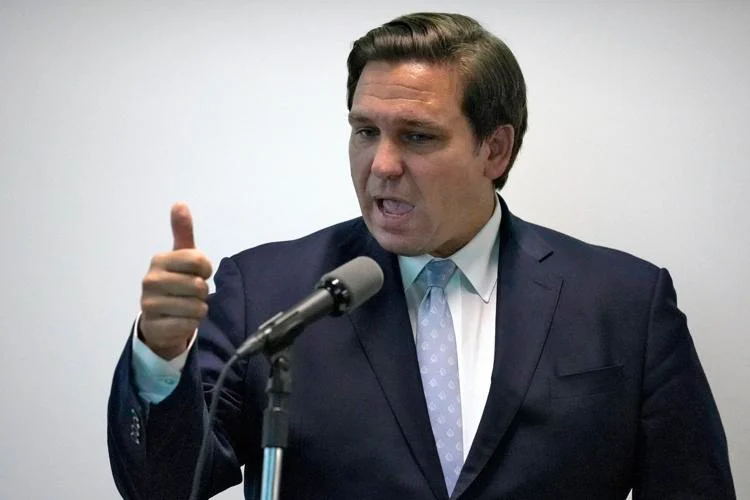
As of January 23, 2023, PredictIt’s 2024 presidential market shows Florida Gov. Ron DeSantis leading at $0.31, followed by President Joe Biden at $0.29, former President Donald Trump at $0.21, and California Governor Gavin Newsom at $0.12. No other candidate has more than a $0.10 share price. The share price, which rises and falls based on market demand, roughly corresponds to the market’s estimate of the probability of an event taking place. Trump is the only candidate of this group to have officially announced his presidential campaign. The Democratic presidential primary market shows Biden leading the pack at $0.52. Two other candidates have a share price at or above $0.10: California Governor Gavin Newsom is at $0.20, and Vice President Kamala Harris is at $0.11. DeSantis currently leads in the Republican presidential primary market at $0.38, followed by Trump at $0.32. No other candidate has a share price at or above $0.10. PredictIt is an online political futures market in which users purchase shares relating to the outcome of political events using real money. Each event, such as an election, has a number of contracts associated with it, each correlating to a different outcome. Services such as PredictIt can be used to gain insight into the outcome of elections. Due to action from the Commodity Futures Trading Commission, PredictIt may halt trading on February 15, 2023. Republished with the permission of The Center Square
Joe Biden walks stretch of U.S.-Mexico border, amid GOP criticism

President Joe Biden walked a muddy stretch of the U.S.-Mexico border and inspected a busy port of entry Sunday on his first trip to the region after two years in office, a visit shadowed by the fraught politics of immigration as Republicans try to blame him for the record numbers of migrants crossing into the country. At his first stop, the president observed as border officers in El Paso demonstrated how they search vehicles for drugs, money, and other contraband. Next, he traveled to a dusty street with abandoned buildings and a small playground. Near the street was a metal border fence that separated the U.S. city from Ciudad Juarez. Biden walked slowly along the border wall, initially joined by two Border Patrol agents. In a sign of the deep tensions over immigration, Texas Gov. Greg Abbott, a Republican, handed Biden a letter upon his arrival in the state that said the “chaos” at the border was a “direct result” of the president’s failure to enforce federal laws. Biden later took the letter out of his jacket pocket during his tour, telling reporters, “I haven’t read it yet.” Asked what he’s learned by seeing the border firsthand and speaking with the officers who work along it, Biden said: “They need a lot of resources. We’re going to get it for them.” Immigration for years has been a serious point of conflict, exposing both the dysfunction of the U.S. system as well as the turmoil within migrants’ home countries that has pushed many to flee. Administration officials have tried to counter Republican criticism by saying Congress should work with them to increase border security funding and overhaul immigration policy. Biden was spending just a few hours in the city, which is currently the biggest corridor for illegal crossings, in large part due to Nicaraguans fleeing repression, crime, and poverty in their country. They are among migrants from four countries who are now subject to quick expulsion under new rules enacted by the Biden administration in the past week that drew strong criticism from immigration advocates. The president also was to visit the El Paso County Migrant Services Center and meet with nonprofits and religious groups that support migrants arriving to the U.S. It was not clear whether he would talk to any migrants. Biden’s announcement on border security and his visit to the border are aimed in part at quelling the political noise and blunting the impact of upcoming investigations into immigration promised by House Republicans. But any enduring solution will require action by the sharply divided Congress, where multiple efforts to enact sweeping changes have failed in recent years. From El Paso, Biden was to continue south to Mexico City, where he and the leaders of Mexico and Canada will gather on Monday and Tuesday for a North American leaders summit. Immigration is among the items on the agenda. In El Paso, where migrants congregate at bus stops and in parks before traveling on, border patrol agents stepped up security before Biden’s visit. “I think they’re trying to send a message that they’re going to more consistently check people’s documented status, and if you have not been processed they are going to pick you up,” said Ruben Garcia of the Annunciation House aid group in El Paso. Migrants and asylum-seekers fleeing violence and persecution have increasingly found that protections in the United States are available primarily to those with money or the savvy to find someone to vouch for them financially. Venezuelan migrant Jose Castillo, who said he traveled without family members for five months from his home on Margarita Island to arrive in El Paso on December 29, said he hoped Biden “will take us into consideration as the human beings we are.” Castillo was among a group of about 30 migrants who gathered for prayers Sunday morning outside the Sacred Heart Catholic Church where many of the newcomers have been camping. “We have suffered a lot since entering the jungle of the Darien Gap and passing through Mexico. It has all been a battle, battle, battle,” he said. “I know that we are here illegally, but please give us a chance.” The numbers of migrants crossing the U.S.-Mexico border has risen dramatically during Biden’s first two years in office. There were more than 2.38 million stops during the year that ended Sept. 30, the first time the number topped 2 million. The administration has struggled to clamp down on crossings, reluctant to take hard-line measures that would resemble those of former President Donald Trump’s administration. The policy changes announced this past week are Biden’s biggest move yet to contain illegal border crossings and will turn away tens of thousands of migrants arriving at the border. At the same time, 30,000 migrants per month from Cuba, Nicaragua, Haiti, and Venezuela will get the chance to come to the U.S. legally as long as they travel by plane, get a sponsor and pass background checks. The U.S. will also turn away migrants who do not seek asylum first in a country they traveled through en route to the U.S. Migrants are being asked to complete a form on a phone app so that they can go to a port of entry at a pre-scheduled date and time. Homeland Security Secretary Alejandro Mayorkas told reporters aboard Air Force One that the administration is trying to “incentivize a safe and orderly way and cut out the smuggling organizations,” saying the policies are “not a ban at all” but an attempt to protect migrants from the trauma that smuggling can create. The changes were welcomed by some, particularly leaders in cities where migrants have been massing. But Biden was excoriated by immigrant advocate groups, which accused him of taking measures modeled after those of the former president. Administration officials disputed that characterization. For all of his international travel over his 50 years in public service, Biden has not spent much time at the U.S.-Mexico border. The only visit that the White House could point to was Biden’s drive
Katie Britt is sworn in as U.S. Senator

Katie Britt was sworn into the U.S. Senate floor on Tuesday. The swearing-in ceremony took place on the Senate floor shortly after the first session of the 118th Congress convened. “It was a humbling moment to take the oath of office today on the Senate floor,” said newly sworn-in Senator Katie Britt. “I am truly grateful to the people of Alabama for their trust, confidence, and prayers. Now, it’s time to get to work to fight for our people, our liberties, and our values. It will be my mission every day in the Senate to be a leader who looks to identify and implement tangible, meaningful solutions to the serious challenges and opportunities facing both Alabama and America, so hardworking families can thrive in strong communities. Looking up to the gallery from the Senate floor today and seeing my two children smiling down at me reminded me what this is all about – preserving the American Dream for generations to come. As this new year gets underway, my family and I would like to wish everyone a healthy, safe, and prosperous 2023. I have no doubt that our brightest days are ahead. May God continue to bless our great state and nation.” In keeping with traditional protocol, U.S. Senator Tommy Tuberville, as Alabama’s new senior senator escorted Senator Britt to Vice President Kamala Harris, who administered the oath as the Senate’s presiding officer. Members of Senator Britt’s family watched the swearing-in from the Senate gallery. Almost 500 Alabamians traveled to Washington to celebrate the landmark occasion in person. Senator Britt’s temporary office space is in the Dirksen Senate Office Building. Her new official Senate website, while a work in progress, is now online and active. Britt is in the process of adding constituent services to the page, which is still a work in progress. This is Britt’s first elected office. Britt replaces the retiring Sen. Richard Shelby, who served for 36 years in the Senate from 1987 to 2022. Twenty years ago, Britt’s life changed when during college, she served an internship with Shelby’s office. Later she served as Shelby’s former chief of staff. Katie is a native of Coffee County. She is married to lobbyist Wesley Britt – a native of Cullman County. They have two children and reside in Montgomery. Congressman Dale Strong was also sworn in on Tuesday. To connect with the author of this story, or to comment, email brandonmreporter@gmail.com.
Joe Guzzardi: Bussed migrants prove limits to inviting the world

Emotions are raw; temperatures are heated, and embattled parties are exchanging strong statements. The uproar’s cause: illegal immigrants being sent to sanctuary cities. New York, Chicago, and Washington, D.C. mayors Eric Adams, Lori Lightfoot, and Muriel Bowser allege that Texas, Florida, and Arizona governors – Greg Abbott, Ron DeSantis, and Doug Ducey, respectively – are playing politics with migrants’ lives, and that racism motivates their actions. After calling Abbott a racist, Lightfoot openly questioned the Texas governor’s Christian values. Bowser declared that the migrants’ arrival constituted a public emergency and asked the White House to summon the National Guard, an ignored request. Fulfilling a promise he made in April and upping the ante in the immigration debate, DeSantis sent two planes with migrants, mostly Venezuelans, to Martha’s Vineyard, an elitist playground. In the spring, the Florida Department of Transportation received DeSantis’ approval to set aside $12 million to fly the aliens to Martha’s Vineyard and Delaware. Abbott sent two busloads to D.C.’s Naval Observatory, Vice President Kamala Harris’ residence. DeSantis and the other governors counter the mayors’ political grandstanding charges by saying that the financial burden illegal immigrants create should be shared among the states. In the governors’ collective opinions, no destinations are better suited as new homes for aliens than sanctuary cities whose leaders have long avowed their willingness to accept them. Days after the migrants arrived in Chicago – and the total 500 headcount is minuscule compared to the millions that have crossed into Texas – Lightfoot changed her hospitable tone. She shipped the aliens unannounced to suburban Elk Grove Village. Mayor Craig Johnson was as displeased as Adams, Lightfoot, and Bowser with the influx of mostly poor, undereducated, and unskilled into his municipality. Johnson asked: “Why are they coming to Elk Grove?” Johnson’s question is valid. From the moment migrants cross the border, during their resettlement, and indefinitely into the future, taxpayers fund the exorbitant costs. A new financial analysis from the Federation for American Immigration Reform found that to provide for the 1.3 million illegal aliens that Biden has released into the interior and the 1 million estimated gotaways, taxpayers will be assessed $20.4 billion annually, a sum that will be added to the existing $140 billion that’s allotted each year to the existing, long-term illegal alien population. FAIR estimates that each illegal alien costs American taxpayers $9,232 per year and further calculates that the $20.4 billion could provide Supplemental Nutrition Assistance Program (SNAP) benefits to more than 7 million additional needy families, fund and expand the entire National School Lunch Program, hire more than 315,000 police officers to combat the nation’s escalating crime wave across the country, and hire 330,000 new teachers, which would end America’s long-standing teacher shortage. The billions of dollars spent on migrants is against a backdrop of unmet needs in American families. A Brandeis University study found that 35 percent of American families, despite working full-time, year-round, do not meet the “basic family needs budget” – the amount needed for rent, food, transportation, medical care, and minimal household expenses. For black and Hispanic families, 50 percent cannot afford life’s fundamentals. The Brandeis survey showed that low-income families with children are struggling; more than two-thirds of full-time workers don’t earn enough to make ends meet. Those families would need to earn about $11 more per hour to fully cover basic costs, or about $23,500 in additional annual earnings. Black and Hispanic families would require a $12 hourly income spike, $26,500 annually, to meet the family budget. Joe Biden campaigned as Scranton Joe, working America’s champion. But as president, Biden has abandoned his commitment to lower- and middle-class families. Instead, Biden has rewarded illegally present foreign nationals with billions of dollars. As a result, Scranton Joe is as unpopular in his hometown as he is nationwide. In Pennsylvania’s 8th District, that includes Scranton, Biden’s approval rating is 38 percent, indicative of his failures. Joe Guzzardi is a nationally syndicated newspaper columnist who writes about immigration and related social issues. Joe joined Progressives for Immigration Reform in 2018 as an analyst after a ten-year career directing media relations for Californians for Population Stabilization, where he also was a Senior Writing Fellow. A native Californian, Joe now lives in Pennsylvania. Contact him at jguzzardi@pfirdc.org.
Mighty Alabama Strike Force heading to Georgia to campaign for Herschel Walker
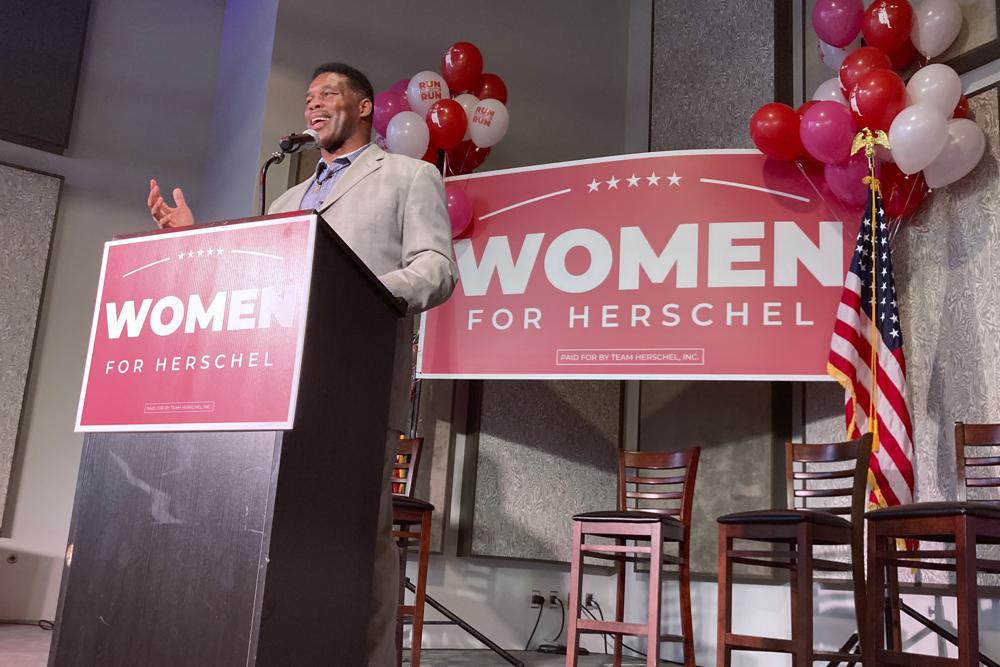
The Alabama Republican Party is recruiting volunteers for its Mighty Alabama Strike Force to campaign door to door for Republican U.S. Senate candidate Hershel Walker. “The Mighty Alabama Strike Force is recruiting volunteers to travel to Georgia in October to knock on doors for Herschel Walker,” said the head of the Strike Force, Joan Reynolds. According to Reynolds, the group is planning to canvass for Walker from October 2–7 as well as October 16-21; and Halloween week from October 30 thru November 4. The general election is on November 8 “Put on your walking shoes, grab your iPhone or android and let’s win back the U.S Senate,” Reynolds stated. “We have a good candidate, and we need all hands on deck. Lodging and transportation to the city is provided by our donors.” Walker addressed the Alabama Republican Party at its August 17 Summer Dinner. Walker, a standout football player at the University of Georgia and several professional teams, is challenging incumbent Sen. Raphael Warnock. The Senate is currently divided 50 Republicans: 48 Democrats, and two independents who caucus with the Democrats, meaning that Vice President Kamala Harris gives Democrats control over the body. “If you cannot travel, we have an opportunity for you to make calls from home,” Reynolds said. “If you prefer to campaign in Alabama, we can put you in contact with the campaigns locally. We have something for everyone to do. Don’t be left behind. We only ask for one week out of every two years. Our country is worth it.” Joan Reynolds is the Chair of the Shelby County Republican Party and the wife of Paul Reynolds, the Alabama Republican National Committeeman. The Mighty Alabama Strike Force most recently deployed to Virginia, where they helped Republican Glenn Youngkin win his 2021 gubernatorial race. In 2020 they deployed to Florida, where they helped incumbent Donald Trump win the hotly contested swing state. The 2022 election is being hotly contested. Republicans are hopeful that they can take one or both Houses of Congress. The Georgia Senate race is right at the center of this battle. To connect with the author of this story, or to comment, email brandonmreporter@gmail.com.
Artemis 1 launch scrubbed after engine issues

The Space Launch System (SLS) was supposed to have launched today at 7:30 a.m. for the Artemis I mission, but a problem loading the fuel led to NASA Launch Director Charlie Black Thompson giving the order to scrub the mission at 7:35 after engineers were unable to figure out how to fix the problem. NASA explained that the supercooled liquid hydrogen that powers the RS-25 engine is extremely light and is kept at minus-423 degrees Fahrenheit, which makes it a difficult propellant to control. NASA conditions the engines by bleeding liquid hydrogen through them approximately an hour before ignition. The bleed line for engine number three failed. While liquid oxygen loading into the interim cryogenic propulsion stage continued and core stage tanks continued to be replenished with propellants, engineers attempted to troubleshoot the unexpected issue with engine number three. Without the bleed line functioning, the correct temperature of the fuel was not kept. Countdown was halted 40 minutes before launch. After engineers failed to diagnose and fix the problem in time to stay within the two-hour launch window, Thompson ordered the mission scrubbed. The next launch window is Friday at 11:30 a.m. CDT. Being able to launch then will depend on whether or not NASA engineers can fix the problem in order to safely launch the SLS. This is a problem that NASA calls cryopumping. NASA has experience with this issue as it periodically delayed space shuttle missions as well. While the SLS is fully fueled, engineers are gathering data on engine number three in an attempt to understand and resolve the issue. “We don’t launch if it is not right,” said NASA Administrator Bill Nelson. “It is illustrative that this is a complicated machine, and it is a very complicated system.” Nelson said that sometimes missions have to be scrubbed. “It is just part of the space business, and it is particularly part of a test flight,” Nelson said. Vice President Kamala Harris was on hand for the anticipated launch. “She is fully briefed on the whole thing,” Nelson said. “She is a very enthusiastic space flight booster, as is President (Joe) Biden.” Artemis I was not a crewed mission. It was the first test of the SLS and the Orion spacecraft, which is designed to carry astronauts. The Artemis missions, NASA hopes, will take American astronauts back to the moon. This was the first attempt to launch the multibillion-dollar rocket paired with the Orion module. Boeing is the prime contractor for the project, which has cost $23 billion to this point. The goal of the Artemis program is to create a sustainable human presence on and in a space station, Gateway, that will orbit the moon. Artemis I will launch the Orion capsule to the Moon. It is expected to spend 42 days in space and orbit the Moon before returning to Earth. It will take six days just to reach the Moon. Artemis II will be crewed and will carry as many as four astronauts into lunar orbit. Artemis III is expected to land on the Moon as early as 2025. It is too early to tell if today’s issue that led to the launch being scrubbed will further delay future Artemis missions. The SLS has been designed and engineered at Marshall Space Flight Center in Huntsville. To connect with the author of this story, or to comment, email brandonmreporter@gmail.com.
Mike Rogers warns that Republicans will have to compromise after taking control of the House of Representatives

Congressman Mike Rogers spoke to the St. Clair County Young Republicans on Thursday about GOP priorities when the Republicans retake control of the House of Representatives in the midterm elections. Rogers predicted that Republicans would win control of the House of Representatives in the November 8 general elections. “They know they are going to lose the majority,” Rogers said of the Democrats. “We know they are going to lose the majority. The party of the President historically loses an average of 28 seats in his first term because Presidents get in there and start changing things.” “We think we could pick up between 20 and 46 seats,” Rogers said. “We have 214. There are not as many seats in play as the 2010 elections, where we picked up 60 seats, but we only had 185 seats then. We need 218 to take the majority.” “218 is not enough, as Nancy Pelosi is finding out,” Rogers said. “The House has 435 members; they have a four-vote majority. It is almost impossible for them to get all of their 218 members there to vote.” Rogers said Speaker Pelosi has gotten around that issue by using proxy voting, where a member gives their vote to a proxy to vote for them. “We had 35 Democrats that never ever showed up in Washington for a year after they were sworn in,” Rogers said. “We think it is unconstitutional. We have a lawsuit in place. The pandemic is in the rear-view mirror, and they are still using proxy voting. It will be one of the first things we change when we take over.” “On election night, 218 is not the number to watch – it is more like 233 or 240,” Rogers said. “We are going to have to have more than a small majority in order to really get things done. Both sides have got problem members. Even though we had the majority, it was difficult for us to get things done because we could never get those 12 to 15 hard-core members to go along with the caucus. They would rather kill legislation than vote for bills that could pass in the Senate. I call them legislative terrorists.” Rogers expressed confidence that Republicans would take the majority in the House. “I am very optimistic that we will have a strong majority,” Rogers continued, predicting that the number would be 240 House Republicans. “This is going to be historic. I have seen the (poll) numbers on my side. People are hopping mad. The biggest two issues are the economy and wokeism.” Rogers warned that even with control of the House, the Senate would also be an issue. “When we do take control, temper your expectations,” Rogers said. “We will control the House, but 53 or 54 seats is the best-case scenario in the Senate, and that is not enough to clear the Senate’s 60 vote filibuster rule.” “Democrats are going to have a say in legislation in the Senate,” Rogers warned. “We are going to have to compromise.” “The executive branch still has immense power because they control all of these executive agencies,” Rogers said. “We have got to get the Presidency back in 2024.” “We will control the purse strings so we can stop a lot of stuff,” Rogers said. “Those 87,000 IRS agents – that will never happen. Finding workers in this economy is a challenge. They have got to recruit them. Then they have got to train them. It will take months, and by then, we will be in charge of the purse strings. Those 87,000 agents will never happen. That’s one thing we can do. We can also stop all of these woke initiatives in the Department of Defense and the Education Department.” Rogers was asked if the Republicans were going to impeach Vice President Kamala Harris and President Joe Biden. “Homeland Secretary [Alejandro] Mayorkas and Merrick Garland will be our targets,” Rogers said. “Mayorkas has lied to the Congress, saying that he has control of the southern border when he hasn’t even tried.” St. Clair County Young Republican Chairman Logan Glass said that the group would next meet in October. Mike Rogers has represented Alabama’s Third Congressional District since 2002. To connect with the author of this story, or to comment, email brandonmreporter@gmail.com.
Joe Biden signs massive climate and health care legislation
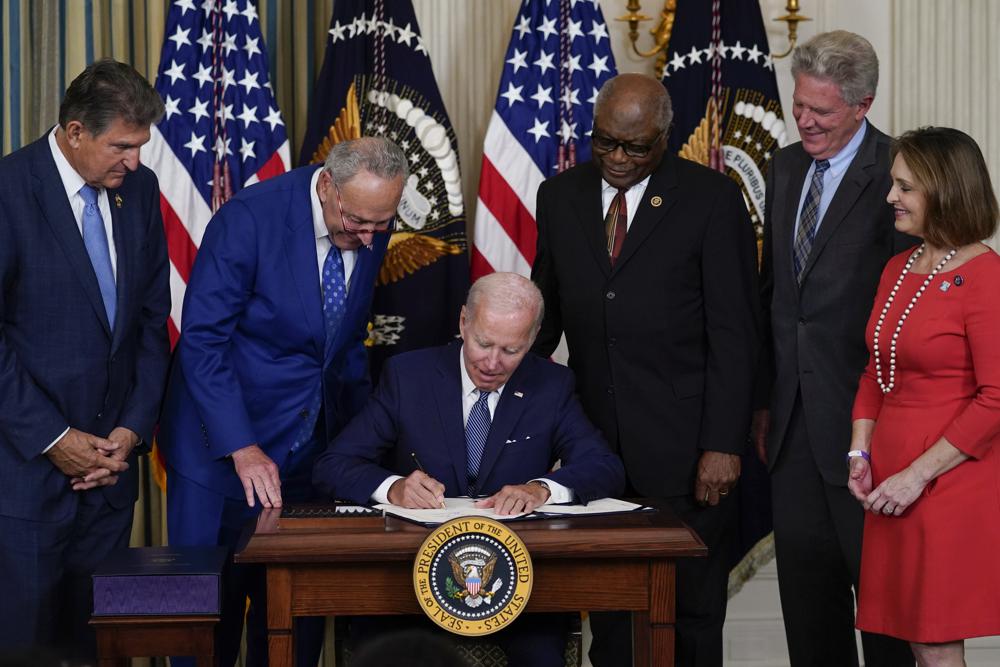
President Joe Biden signed Democrats’ landmark climate change and health care bill into law on Tuesday, delivering what he has called the “final piece” of his pared-down domestic agenda, as he aims to boost his party’s standing with voters less than three months before the midterm elections. The legislation includes the most substantial federal investment in history to fight climate change — some $375 billion over the decade — and would cap prescription drug costs at $2,000 out-of-pocket annually for Medicare recipients. It also would help an estimated 13 million Americans pay for health care insurance by extending subsidies provided during the coronavirus pandemic. The measure is paid for by new taxes on large companies and stepped-up IRS enforcement of wealthy individuals and entities, with additional funds going to reduce the federal deficit. In a triumphant signing event at the White House, Biden pointed to the law as proof that democracy — no matter how long or messy the process — can still deliver for voters in America as he road-tested a line he will likely repeat later this fall ahead of the midterms: “The American people won, and the special interests lost.” “In this historic moment, Democrats sided with the American people, and every single Republican in the Congress sided with the special interests in this vote,” Biden said, repeatedly seizing on the contrast between his party and the GOP. “Every single one.” The House on Friday approved the measure on a party-line 220-207 vote. It passed the Senate days earlier, with Vice President Kamala Harris breaking a 50-50 tie in that chamber. “In normal times, getting these bills done would be a huge achievement,” Senate Majority Leader Chuck Schumer, D-N.Y., said during the White House ceremony. “But to do it now, with only 50 Democratic votes in the Senate, over an intransigent Republican minority, is nothing short of amazing.” Biden signed the bill into law during a small ceremony in the State Dining Room of the White House, sandwiched between his return from a six-day beachside vacation in South Carolina and his departure for his home in Wilmington, Delaware. He plans to hold a larger “celebration” for the legislation on September 6 once lawmakers return to Washington. The signing caps a spurt of legislative productivity for Biden and Congress, who in three months have approved legislation on veterans’ benefits, the semiconductor industry, and gun checks for young buyers. The president and lawmakers have also responded to Russia’s invasion of Ukraine and overwhelmingly supported NATO membership for Sweden and Finland. With Biden’s approval rating lagging, Democrats are hoping that the string of successes will jump-start their chances of maintaining control in Washington in the November midterms. The 79-year-old president aims to restore his own standing with voters as he contemplates a reelection bid. The White House announced Monday that it was going to deploy Biden and members of his Cabinet on a “Building a Better America Tour” to promote the recent victories. One of Biden’s trips will be to Ohio, where he’ll view the groundbreaking of a semiconductor plant that will benefit from the recent law to bolster production of such computer chips. He will also stop in Pennsylvania to promote his administration’s plan for safer communities, a visit that had been planned the same day he tested positive for COVID-19 last month. Biden also plans to hold a Cabinet meeting to discuss how to implement the new climate and health care law. Republicans say the legislation’s new business taxes will increase prices, worsening the nation’s bout with its highest inflation since 1981. Though Democrats have labeled the measure the Inflation Reduction Act, nonpartisan analysts say it will have a barely perceptible impact on prices. Senate Minority Whip John Thune, R-S.D., on Tuesday continued those same criticisms, although he acknowledged there would be “benefit” through extensions on tax credits for renewable energy projects like solar and wind. “I think it’s too much spending, too much taxing, and in my view wrong priorities, and a super-charged, super-sized IRS that is going to be going after a lot of not just high-income taxpayers but a lot of mid-income taxpayers,” said Thune, speaking at a Chamber of Commerce event in Sioux Falls. The administration has disputed that anyone but high earners will face increased tax scrutiny, with Treasury Secretary Janet Yellen directing the tax agency to focus solely on businesses and people earning more than $400,000 per year for the new audits. The measure is a slimmed-down version of the more ambitious plan to supercharge environment and social programs that Biden and his party unveiled early last year. Biden’s initial 10-year, $3.5 trillion proposal also envisioned free prekindergarten, paid family and medical leave, expanded Medicare benefits, and eased immigration restrictions. That crashed after centrist Sen. Joe Manchin, D-W.Va., said it was too costly, using the leverage every Democrat has in the evenly divided Senate. During the signing event, Biden addressed Manchin, who struck the critical deal with Schumer on the package last month, saying, “Joe, I never had a doubt,” as the crowd chuckled. Later, outside the White House, Manchin said he has always maintained a “friendly relationship” with Biden, and it has “never been personal” between the two, despite Manchin breaking off his negotiations with the White House last year. “He’s a little bit more vintage than I am, but not much,” Manchin said of Biden. Though the law is considerably smaller than their initial ambitions, Biden and Democrats are hailing the legislation as a once-in-a-generation investment in addressing the long-term effects of climate change, as well as drought in the nation’s West. The bill will direct spending, tax credits, and loans to bolster technology like solar panels, consumer efforts to improve home energy efficiency, emission-reducing equipment for coal- and gas-powered power plants, and air pollution controls for farms, ports, and low-income communities. Another $64 billion would help 13 million people pay premiums over the next three years for privately bought health insurance under the Affordable Care Act. Medicare would gain the power to negotiate its costs for pharmaceuticals, initially in 2026, for only ten drugs. Medicare beneficiaries’ out-of-pocket prescription costs
Senators Tommy Tuberville and Richard Shelby slam ‘reckless’ tax package
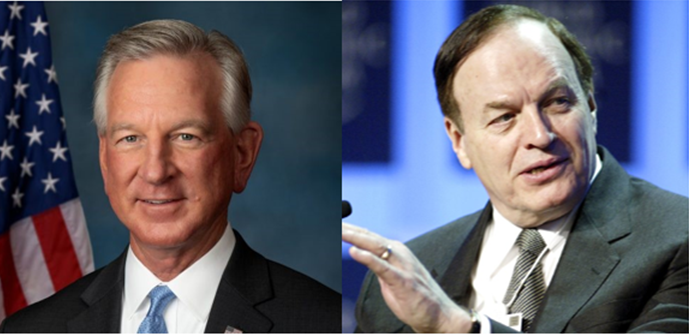
On Sunday, the U.S. Senate passed the Inflation Reduction Act in a partisan 51-50 vote. Vice President Kamala Harris cast the tie-breaking vote after an all-night session. The bill includes the largest-ever federal effort on climate change, caps out-of-pocket drug costs for seniors on Medicare to $2,000 a year, and extends expiring subsidies that help 13 million people afford health insurance. According to the AP, the whole package is paid for, with some $300 billion in extra revenue for deficit reduction by raising corporate taxes and reaping savings by allowing the government to negotiate drug prices for Medicare. U.S. Senator Tommy Tuberville and Richard Shelby released statements after voting against the Democrats’ spending package. The Senators attempted to file amendments to the bill, including making Donald Trump-era tax cuts for the middle class permanent and amendments to secure American energy independence by requiring approval of all pending major pipeline projects and offshore drilling permit requests. “Democrats have once again put their own agenda ahead of helping hardworking Americans. This latest tax and spend spree will further increase inflation and raise taxes on families at a time when they can least afford it,” stated Tuberville. “I worked with my Republican colleagues to offer commonsense amendments to this package that would cut taxes, slash regulations, stand up to China, and bolster our national security. Unfortunately, Senate Democrats shot down these proposals and forced through a bill that does nothing to improve or grow our economy. Instead, their bill provides funding for their Green New Deal policies, sends American businesses overseas, and doubles the size of the IRS, giving the agency more manpower to go after small business and the middle class.” Senator Shelby argued the package would increase costs for Americans. “The so-called ‘Inflation Reduction Act’ will result in increased costs for hardworking Americans, further crushing families’ budgets and savings,” Shelby stated. “Democrats are spending hundreds of billions of dollars to raise taxes and swell the cost of living while the American people are enduring record-high inflation and a declining economy. This makes no sense. Right now, Congress should be focused on reducing costs and growing economic investment, not spending $80 billion to double the size and scope of the IRS and hundreds of billions of dollars to combat climate change.” “The policies created in this legislation are not what Americans want, nor are they what Americans need. I am disappointed that my Senate Democratic colleagues supported this legislation knowing it fails the American people,” Shelby concluded. President Joe Biden released a statement after the bill’s passage. “Today, Senate Democrats sided with American families over special interests, voting to lower the cost of prescription drugs, health insurance, and everyday energy costs and reduce the deficit, while making the wealthiest corporations finally pay their fair share. I ran for President promising to make government work for working families again, and that is what this bill does — period,” Biden stated.
Joe Manchin, Chuck Schumer report abrupt deal on health, energy, taxes
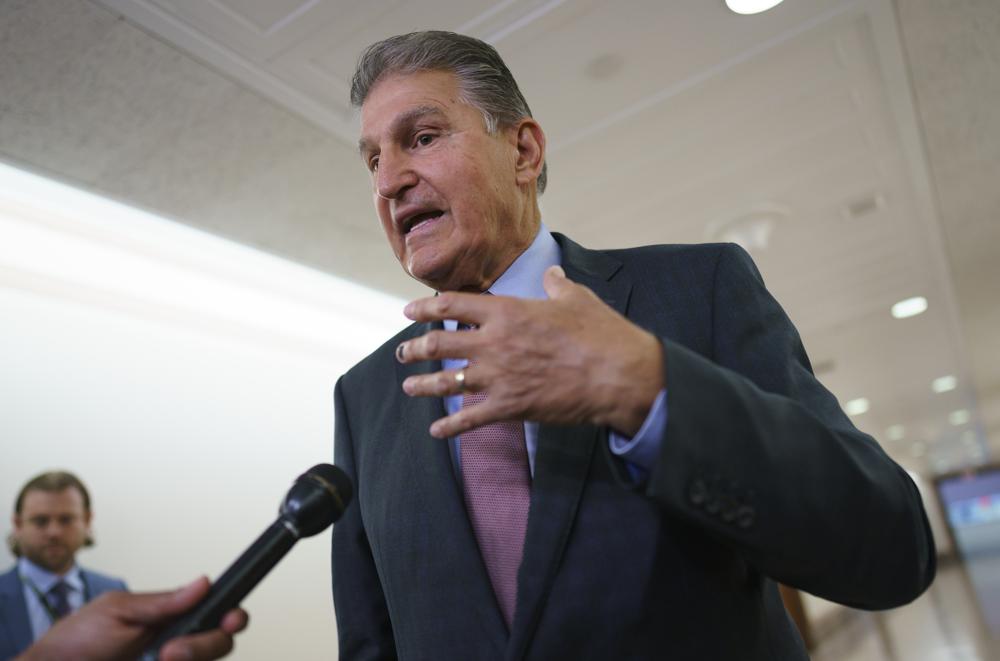
In a startling turnabout, Senate Majority Leader Chuck Schumer and Sen. Joe Manchin announced Wednesday they had reached an expansive agreement that had eluded them for months on health care, energy and climate issues, taxes on higher earners and corporations, and federal debt reduction. The two Democrats said the Senate would vote on the wide-ranging measure next week, setting up President Joe Biden and Democrats for an unexpected victory in the runup to November congressional elections in which their control of Congress is in peril. A House vote would come afterward, perhaps later in August. Unanimous Republican opposition in both chambers seems certain. Just hours earlier, the expectation was that Schumer, D-N.Y., and Manchin, D-W.Va., were at loggerheads and headed toward far narrower package that Manchin was insisting be limited to curbing pharmaceutical prices and extending federal health care subsidies. Earlier Wednesday, numerous Democratic senators had said they were all but resigned to the more modest legislation. The reversal was stunning, and there was no immediate explanation for Manchin’s abrupt willingness to back a bolder, broader measure. Since last year, the West Virginian had used his pivotal vote in the 50-50 Senate to force Biden and Democrats to abandon far more ambitious and expensive versions of the package. He dragged them through months of negotiations in which leaders’ concessions to shrink the legislation proved fruitless, antagonizing the White House and most congressional Democrats. “This is the action the American people have been waiting for. This addresses the problems of today — high health care costs and overall inflation — as well as investments in our energy security for the future,” Biden said in a statement. He added, “If enacted, this legislation will be historic, and I urge the Senate to move on this bill as soon as possible and for the House to follow as well.” Tellingly, Democrats were calling the measure “The Inflation Reduction Act of 2022” because of its provisions aimed at helping Americans cope with this year’s dramatically rising consumer costs. Polls show that inflation, embodied by gasoline prices that surpassed $5 per gallon before easing, has been voters’ chief concern. For months, Manchin’s opposition to proposed larger packages has been premised in part on his worry that they would fuel inflation. The measure also seemed to offer something for many Democratic constituencies. It dangled tax hikes on the wealthy and big corporations and environmental initiatives for progressives. And Manchin, an advocate for the fossil fuels his state produces, said the bill would invest in technologies for carbon-based and clean energy while also reducing methane and carbon emissions. Manchin said the new measure “would dedicate hundreds of billions of dollars to deficit reduction by adopting a tax policy that protects small businesses and working-class Americans while ensuring that large corporations and the ultra-wealthy pay their fair share in taxes.” The overall proposal is far more modest than the $3.5 trillion package Biden asked Democrats to push through Congress last year, and the pared-down, roughly $2 trillion version that the House approved last November after Manchin insisted on shrinking it. Even then, Manchin shot down that smaller measure in December, asserting it would fuel inflation and was loaded with budget gimmicks. In a summary that provided scant detail, Democrats said Wednesday their proposal would raise $739 billion over the decade in new revenue. That included $313 billion from a 15% corporate minimum tax that a Manchin statement suggested would affect only “billion-dollar companies or larger.” The agreement also contains $288 billion the government would save from curbing pharmaceutical prices, $124 billion from beefing up IRS tax enforcement, and $14 billion from taxing some “carried interest” profits earned by partners in entities like private equity or hedge funds. The measure would spend $369 billion on energy and climate change initiatives and $64 billion to extend federal subsidies for three more years for some people buying private health insurance. Those subsidies, which lower people’s premiums, would otherwise expire at the end of this year. That would leave $306 billion for debt reduction, an effort Manchin has been demanding. While a substantial sum, that’s a small fraction of the trillions in cumulative deficits the government is projected to amass over the coming decade. Sen. Kyrsten Sinema, D-Ariz., who backed Manchin last year in insisting on making the legislation less expensive but objected to proposals to raise tax rates, was still reviewing the agreement, said spokeswoman Hannah Hurley. The spokeswoman referred a reporter to Sinema comments last year supporting a corporate minimum tax. Sen. John Cornyn, R-Texas, said the Democratic agreement would be “devastating to American families and small businesses. Raising taxes on job creators, crushing energy producers with new regulations, and stifling innovators looking for new cures will only make this recession worse, not better.” But if Democrats can hold their troops together, GOP opposition would not stop them. The key is Democratic unity. They can prevail if they lose no more than four votes in the House and remain solidly united in the 50-50 Senate, where Vice President Kamala Harris can cast the tie-breaking vote. “Rather than risking more inflation with trillions in new spending, this bill will cut the inflation taxes Americans are paying, lower the cost of health insurance and prescription drugs, and ensure our country invests in the energy security and climate change solutions we need to remain a global superpower through innovation rather than elimination,” Manchin said. Schumer and Manchin said Democratic leaders’ proposals this fall to revamp permitting procedures would help infrastructure like pipelines and export facilities “be efficiently and responsibly built to deliver energy safely around the country and to our allies.” Collin O’Mara, president and CEO of the National Wildlife Federation, hailed Manchin’s announcement. “This agreement affirms that we can address the climate crisis, lower costs for consumers, lift up frontline and rural communities, and invest in made-in-America jobs and clean energy innovation,” O’Mara said. Sierra Club Legislative Director Melinda Pierce took a more cautious approach. “We are eager to see text


